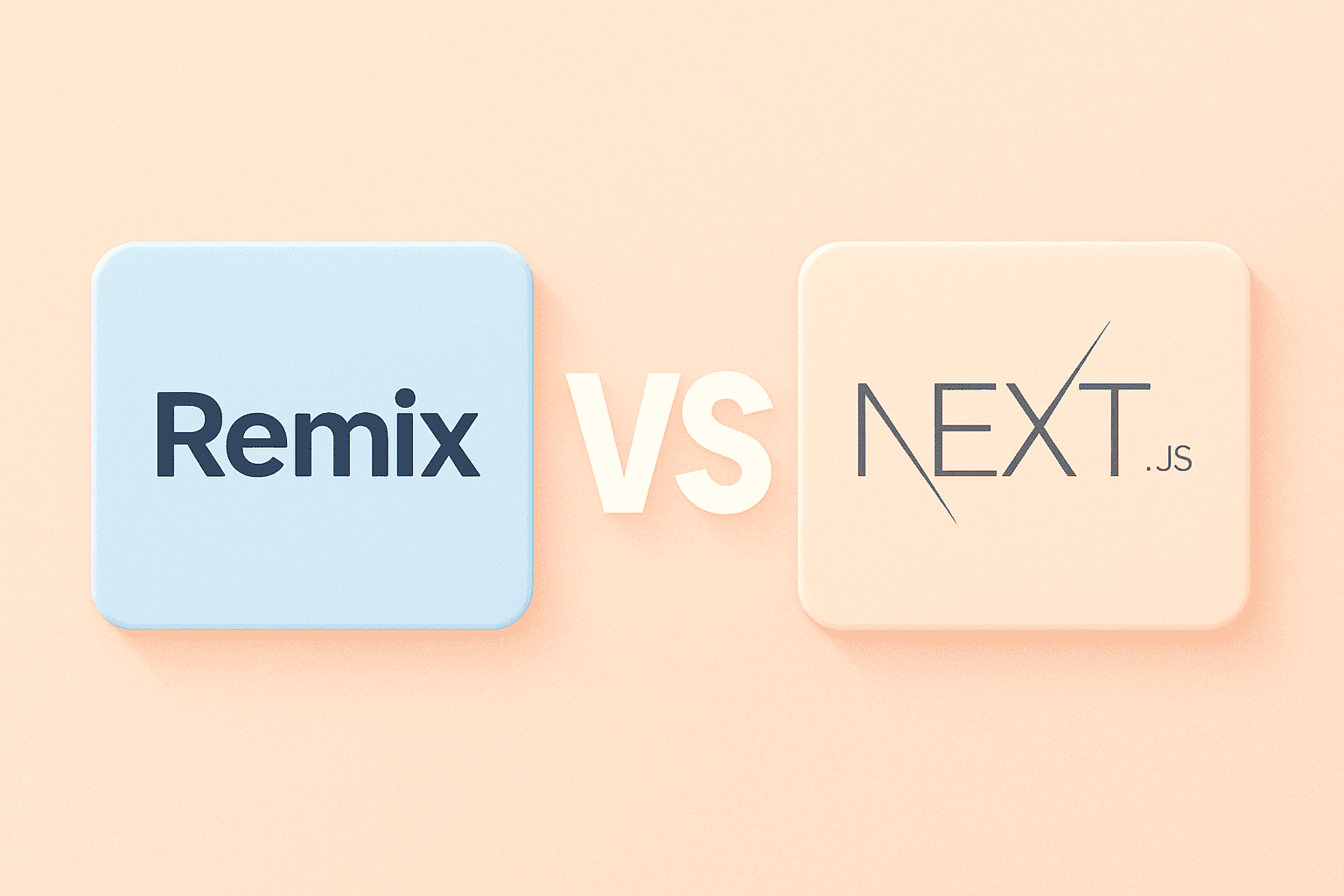In 2025, the web development ecosystem continues to evolve at a rapid pace. Among the most discussed frameworks, Remix and Next.js stand out as two of the most powerful options for building modern web applications. Both are based on React, but each offers unique philosophies, performance patterns, and developer experiences. If you’re wondering which one you should choose for your next project, this in-depth comparison will help you make the right decision.

1. Overview of Remix and Next.js
Remix was designed with a focus on progressive enhancement, fast navigation, and server-side rendering that feels natural. It allows developers to build fast, resilient web apps by leveraging the browser’s native features. Remix embraces web fundamentals such as forms, fetch, and HTTP caching to deliver optimal performance.
Next.js, developed by Vercel, is a more established framework that provides a rich ecosystem for React developers. It offers a full suite of features such as Static Site Generation (SSG), Server-Side Rendering (SSR), API routes, and middleware. It’s known for being developer-friendly and highly scalable.
2. Core Philosophy
The biggest difference between Remix and Next.js lies in their philosophy. Remix focuses on using the web as it was meant to be — progressive, accessible, and fast without over-reliance on JavaScript. Next.js, on the other hand, focuses on flexibility, scalability, and developer experience by offering a large ecosystem and easy integrations.
3. Performance Comparison
Performance is one of the key factors when choosing a framework. Remix optimizes for minimal JavaScript and relies on server-rendered HTML to improve time-to-first-byte (TTFB) and interactivity. Next.js provides multiple rendering modes and optimizes performance through image optimization, caching, and incremental builds.
| Feature | Remix | Next.js |
|---|---|---|
| Rendering Method | SSR-first, enhanced with native web APIs | SSG, SSR, ISR, and CSR available |
| Routing | Nested routes based on file structure | File-based routing with App Router (React Server Components) |
| Data Loading | Loaders and actions for data management | fetch API, React Server Components, getServerSideProps |
| Deployment | Supports any Node.js environment | Optimized for Vercel, supports multiple platforms |
| Learning Curve | Moderate, requires understanding web fundamentals | Easy for React developers |
| Community | Growing but smaller | Large and mature ecosystem |
4. Developer Experience
Remix offers a refreshing approach to web development by encouraging the use of forms and HTTP methods, making it closer to the browser’s natural capabilities. It also has a powerful error handling system that simplifies debugging. Meanwhile, Next.js provides a very comfortable development environment thanks to features like next dev, Hot Module Replacement, and excellent TypeScript support.
5. Ecosystem and Integrations
Next.js has a massive ecosystem of plugins, tools, and templates, making it a perfect choice for enterprises or startups that want rapid scalability. Remix, while newer, integrates well with popular databases and APIs and is supported by modern hosting platforms like Vercel, Fly.io, and Netlify.
6. SEO Capabilities
Both Remix and Next.js offer excellent SEO potential due to their server-side rendering capabilities. However, Remix’s rendering and data-fetching system allows for faster page delivery, which can slightly boost SEO rankings. Next.js shines with built-in tools like next/head and strong support for structured data implementation.
7. When to Choose Remix
- You prefer web fundamentals and progressive enhancement.
- You want fast load times and less JavaScript dependency.
- You’re building complex, data-driven applications.
- You enjoy a server-first approach.
8. When to Choose Next.js
- You want scalability and flexibility for enterprise-grade projects.
- You prefer an established ecosystem with plenty of community support.
- You’re using Vercel or other managed hosting platforms.
- You need hybrid rendering modes (SSG, ISR, SSR).
9. The Future of Remix and Next.js in 2025
In 2025, both Remix and Next.js are likely to continue growing. Remix’s tight integration with React Router v7 and evolving data APIs make it a strong contender for performance-driven apps. Meanwhile, Next.js 15 (expected in 2025) is predicted to bring even more advanced optimizations for React Server Components and streaming SSR.
10. Conclusion: Which One Should You Use?
If you want full control over web fundamentals and performance, Remix is an excellent choice. If you prefer an established, versatile ecosystem with strong support and powerful features, Next.js is the safer bet.
Ultimately, the decision depends on your project type. For startups focusing on innovation and performance, Remix will likely deliver a faster and cleaner experience. For large teams or businesses that value scalability and integration, Next.js remains the go-to framework.
Final Verdict: In 2025, Remix is perfect for developers who love working close to the web’s core principles, while Next.js is ideal for those who prioritize ecosystem maturity and productivity.
Both frameworks will dominate the web landscape in 2025 — and whichever you choose, you’ll be building on a solid foundation of React and modern web standards.

